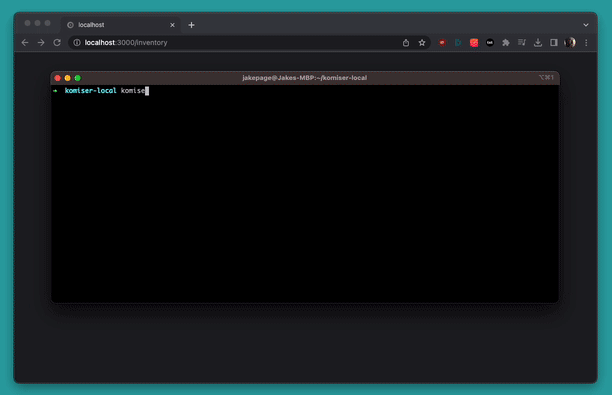Komiser is back 🎉 and we're looking for maintainers to work on the new roadmap, if you're interested, join us on our Discord community
Komiser is an open-source cloud-agnostic resource manager. It integrates with multiple cloud providers (including AWS, Azure, Civo, Digital Ocean, OCI, Linode, Tencent and Scaleway), builds a cloud asset inventory, and helps you break down your cost at the resource level 💰
The fastest and most reliable way to get started with Komiser is signing up for free to Tailwarden Cloud
The easiest way to get started with Komiser is to install the Komiser CLI by running the Homebrew commands below. Don't have Homebrew? Install it here.
brew tap tailwarden/komiser
brew install komiser
Table of Contents
- What is Komiser? 🤷
- Getting started 👇
- Documentation 📖
- Bugs and feature requests 🐞
- Roadmap and Contributing 🛣️
- Users 🧑🤝🧑
- Versioning 🧮
- Contributors
Komiser is an open source project created to analyse and manage cloud cost, usage, security and governance all in one place. With komiser you can also:
- Build an inventory of your cloud infrastructure assets.
- Control your resource usage and gain visibility across all used services to achieve maximum cost-effectiveness.
- Detect potential vulnerabilities that could put your cloud environment at risk.
- Get a deep understanding of how you spend on the AWS, Azure, GCP, Civo, OVH, DigitalOcean and OCI.
- Uncover idle and untagged resources, ensuring that no resource goes unnoticed.
Komiser was built with every Cloud Engineer, Developer, DevOps engineer and SRE in mind. We understand that tackling cost savings, security improvements and resource usage analyse efforts can be hard, sometimes just knowing where to start, can be the most challenging part at times. Komiser is here to help those cloud practitioners see their cloud resources and accounts much more clearly. Only with clear insight can timely and efficient actions take place.
You can run Komiser locally, as a Docker container or by running it inside a Kubernetes cluster. Below are the available downloads for the latest version of Komiser. Please download the appropriate package for your operating system and architecture.
- Connect a local deployment of Komiser CLI to you AWS account
- If you want to connect a single AWS account follow the documentation here.
Watch the installation video here
- If you would like to connect various AWS accounts to a Komiser deployment in a Management EKS cluster, follow the steps here.
Connect a local deployment of Komiser CLI to you Azure account.
Connect a local deployment of Komiser CLI to you GCP account.
Connect a local deployment of Komiser CLI to your Civo account. Watch the installation video here
Connect a local deployment of Komiser CLI to your OCI account.
Connect a local deployment of Komiser CLI to you Digital Ocean account.
Connect a local deployment of Komiser CLI to you Linode account.
Connect a local deployment of Komiser CLI to you Tencent account.
Connect a local deployment of Komiser CLI to you Scaleway account.
Head over to the official Komiser documentation at docs.komiser.io. The source repository for the documentation website is tailwarden/docs.komiser.io.
We know that writing docs isn't usually at the top of too many peoples "What I like to do for fun" list, but if you feel so inclined, by all means, consider contributing to our documentation repository, we will be very grateful. It's built using Docusaurus.
- Documentation overview
- Installation
- FAQs
- Video series: 📹
Have a bug or a feature request? Please first read the issue guidelines and search for existing and closed issues. If your problem or idea is not addressed yet, please open a new issue.
We are very excited about what is in store in the coming weeks and months, take a look at the public roadmap to stay on top of what's coming down the pipeline.
Komiser is written in Golang and is Elv2 licensed - contributions are always welcome whether that means providing feedback, be it through GitHub, through the #feedback channel on our Discord server or testing existing and new features. Feel free to check out our contributor guidelines and consider becoming a contributor today.
Learn how to contribute with these walkthrough videos:
If you'd like to have your company represented and are using Komiser please give formal written permission below via email to [email protected].
We will need a URL to an SVG or png logo, a text title, and a company URL.
We use SemVer for versioning. For the versions available, see the tags on this repository.









